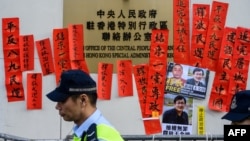Several human rights organizations say China has intensified persecution against human rights lawyers and their family members in recent months, as the ailing wife of a lawyer is denied access to her pension and medical insurance, while the children of two lawyers are repeatedly forced by local authorities to drop out of schools.
VOA has reached out to the Chinese Foreign Ministry for comment but has yet to receive a response.
On March 31, 16 human rights lawyers and dissidents in China called for donations to Chinese human rights lawyer Zhou Shifeng, whose family struggles to pay for his wife’s mounting medical bills because she hasn’t been able to access social insurance or her pension.
Zhou’s wife has been disabled since suffering a serious stroke in 1995. Since Zhou was sentenced to seven years in jail for “inciting subversion of state power” in 2015, which was part of the Chinese government’s nationwide crackdown against more than 300 human rights lawyers, his wife hasn’t been able to regularly pay for her social insurance or properly handle her retirement application.
“Before his arrest, Zhou’s law firm would pay for his wife’s social insurance and he would take care of everything she needed,” said Ren Quanniu, a Chinese human rights lawyer familiar with Zhou’s situation.
“But after he was arrested, her social insurance payment was suspended and no one could help her complete the retirement process in 2017, which caused her to lose access to the social insurance and pension,” he told VOA by phone.
As a result, Zhou’s wife can’t be reimbursed for her mounting medical bills and her rapidly deteriorating health is increasing pressure on her family.
“Her overall health condition deteriorated since Zhou’s arrest in 2015 and it became even more serious since the start of 2024,” Ren said, adding that she has been in the intensive care unit of a local hospital in Henan Province since February.
Like many human rights lawyers in China, Zhou lost his license after he was detained, and since his release in September 2022, he hasn’t been able to find a stable job to support his family. “Since he can no longer work as a lawyer, his family has lost their only source of income,” Ren added.
With no income to pay his wife’s medical bills, Ren said the human rights lawyer’s community wants to support his family by calling for public donations. “His wife is probably hanging by a thread, so we hope to do whatever we can to help support his family through this difficult period,” he said.
Forced to drop out of school
Other human rights lawyers’ families are experiencing repeated forced evictions, while schools are repeatedly turning away their children due to pressure from local authorities.
Wang Quanzhang, a prominent human rights lawyer sentenced to four and a half years on charges of subversion during the 2015 crackdown, has been evicted by landlords or hotels more than a dozen times since last April. He said the forced evictions are part of Chinese authorities’ retaliation against him and his family.
The 2015 crackdown is known in China as the 709 crackdown because it began on July 9, 2015. On that date, Chinese authorities began targeting independent legal advocates and arrested hundreds of lawyers.
“The authorities think our community has been trying to humiliate them, so they want to use all the means at their disposal to punish human rights lawyers,” Wang told VOA in a phone call.
Apart from the forced evictions, Wang said his 11-year-old son has been turned away by schools several times over the last year. “Since we were forced to move to new places so frequently over the last year, it’s been difficult for my son to remain at the same school for long enough,” he said, adding that some schools would turn away his son due to pressure from authorities.
Wang tried to send him abroad for schooling last year, hoping to protect him from the harassment.
“When we tried to leave China last October, the customs officers stopped my son and the daughter of another human rights lawyer and said they weren’t allowed to leave the country since they could be a threat to national security,” he said.
Since then, Wang and his family moved to the southern province of Guangzhou and tried to admit his son to a private academy recommended by his friends.
“After just a week, close to 20 people suddenly showed up at the academy to conduct ‘inspection’ and following their repeated harassment, the academy was forced to move to a more discreet location,” Wang said.
Since it’s unclear when his son may return to school, Wang is signing him up for some online classes to make sure he is still learning something. “The authorities know my son is my biggest weakness so they try to make it difficult for him to go to school, hoping it could stop me from criticizing them,” he told VOA.
Some human rights advocates say the Chinese government has increased the level of persecution against Chinese dissidents and their families in recent years. Yu Zhenyang, the son of detained human rights lawyer Yu Wensheng and his wife Xu Yan, was briefly detained and has tried to commit suicide twice since last November.
“Under Xi Jinping’s rule, persecutions against the children of Chinese dissidents have increased and it’s now a new normal,” said Zhou Fengsuo, a former Tiananmen student leader and executive director of New York-based organization Human Rights in China. He spoke to VOA by phone.
During a Universal Periodic Review, held by the U.N. Human Rights Council in January, China’s top diplomat in Geneva said Beijing is dedicated to “safeguarding the rights of specific groups” and “implementing four consecutive cycles of outlines for children's development.”





